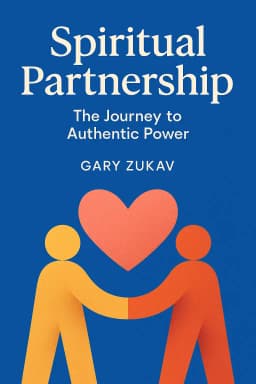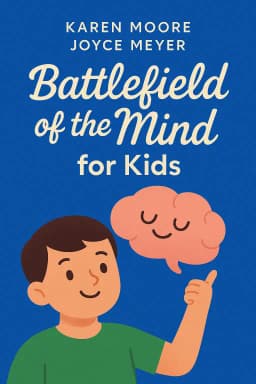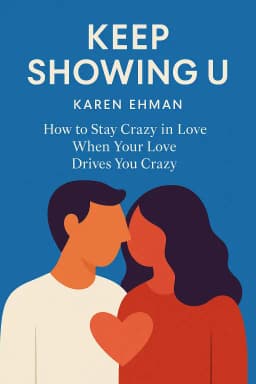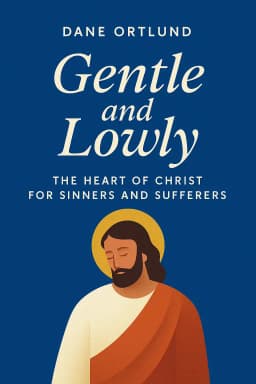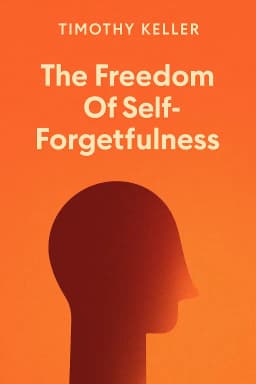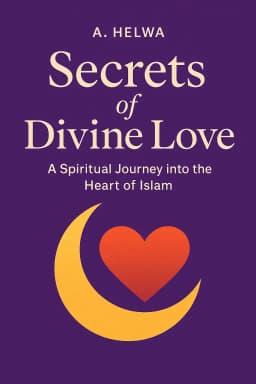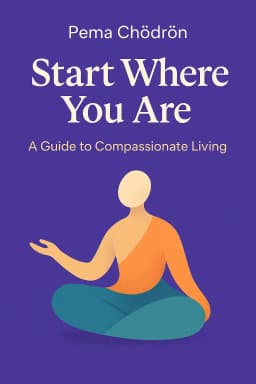
The Ghost in Your Genes
Golden Hook & Introduction
SECTION
Daniel: You probably think your DNA is a fixed blueprint, the unchangeable 'you.' But what if science is proving that's wrong? A single cell in your body already has hundreds of mutations that make it different from its neighbors. Your identity is literally changing as we speak. Sophia: Whoa, hold on. So the code that supposedly makes me 'me' is already out of date? That feels... unsettling. It’s like finding out the original architectural plans for your house are being scribbled on by a ghost every night. Daniel: Exactly! It’s a ghost called biology. And this is the mind-bending territory we're exploring today, all thanks to the book The Dharma in DNA: Insights at the Intersection of Biology and Buddhism by Dee Denver. Sophia: And Denver isn't a philosopher or a monk, which is what you might expect. He's a hardcore evolutionary geneticist, a professor and department head at Oregon State University. What's wild is that his journey into this started when he, a firm atheist influenced by thinkers like Richard Dawkins, impulsively went to see the Dalai Lama speak. Daniel: It’s the ultimate collision of worlds. That one event challenged everything he thought he knew and sent him on this quest to see if ancient Buddhist wisdom could be tested in the lab. And the results are absolutely fascinating. That encounter is really the perfect place to start, because it captures the central tension of the book.
The Scientist's Awakening: When the Dalai Lama Meets DNA
SECTION
Daniel: So picture this: it's 2003. Dee Denver is a successful postdoctoral scholar, deep in the world of evolutionary genetics. His life revolves around DNA, mutation rates, and hard data. He's a committed atheist, and to him, religion is just a collection of comforting but ultimately baseless stories. Sophia: I can totally picture this guy. Probably thinks in spreadsheets and views the world as a series of solvable equations. Daniel: Pretty much. So he and his wife are in Bloomington, Indiana, and they hear the Dalai Lama is giving a talk. On a whim, they buy tickets. Denver goes in fully expecting, in his own words, to hear a lot of "nonsense." He's restless, annoyed, just waiting for it to be over. Sophia: Oh, I’ve been there. Dragged to an event you’re sure you’re going to hate. You’re just mentally composing a grocery list the whole time. Daniel: Exactly. But then the Dalai Lama says something that completely shatters his skepticism. He doesn't talk about gods or faith in a dogmatic way. Instead, he says, and this is the key quote: "Things should only be believed if they were tested for truth." Sophia: Wow. Okay, that’s not what I would have expected. He’s basically speaking the language of science. He’s inviting empirical validation. Daniel: That’s precisely what hit Denver so hard. It was a direct appeal to the scientific mindset. Here was this major spiritual leader, essentially saying, "Don't just take my word for it. Investigate. See for yourself if it's true." For Denver, this was a profound shock. It wasn't dogma; it was a call to inquiry. He left that talk feeling a deep sense of existential distress, his neat, orderly, atheistic worldview completely shaken. Sophia: Okay, but lots of people have moving experiences or hear a powerful speaker. What made this different for a scientist? Was it just an emotional moment, or did he see a genuine intellectual bridge being built? Daniel: I think it was both. Emotionally, it was a lightning strike. But intellectually, it was the beginning of a new hypothesis. He started reading about Buddhism and found himself grappling with its core ideas. And this created another paradox in his life. At the same time he was becoming a world expert on DNA and heredity, he and his wife decided to form their family through adoption, not by passing on their own DNA. Sophia: That is a fascinating conflict. His professional life is all about the power of the genetic code, but his personal life is a testament to the idea that family and identity are about so much more than that. Daniel: Exactly. He felt this deep disconnect between his lab work and his life choices. And he started to wonder if the answers to this paradox might lie in the Buddhist teachings he was now exploring. It set him on the path to write this book, which he says has three goals: share his journey, scientifically test Buddhist insights using DNA, and propose a more compassionate, ethical framework for science. Sophia: So he decides to put these ancient ideas to the test. That sounds incredibly ambitious, maybe even a little crazy. Where does he even begin to test something as philosophical as 'non-self' with a molecule like DNA?
Deconstructing the Self: DNA as Impermanent & Interconnected
SECTION
Daniel: That’s the brilliant core of the book. He translates three foundational Buddhist concepts into falsifiable scientific hypotheses. The first is anitya, or impermanence—the idea that everything is in a constant state of flux. The second is anatman, or non-self—the idea that there is no fixed, independent, unchanging 'self' at the core of anything. And the third is pratityasamutpada... Sophia: Hold on, you threw out a big word there—pratityasamutpada. Can you break that down for us in simple terms? What does 'dependent arising' actually mean in the context of a cell? Daniel: Great question. It means that nothing exists on its own. Everything arises in dependence upon other things. It’s a web of mutual cause and effect. Think of it this way: a wave isn't separate from the ocean; it is the ocean expressing itself in a temporary form. The wave dependently arises from the water, the wind, the gravity. Denver’s question is: does DNA behave this way too? Sophia: Okay, so impermanence, non-self, and interconnectedness. How does he connect these grand cosmic ideas to a tiny double helix? Daniel: He starts with a beautiful, large-scale metaphor that he experienced himself. During a trip to Colorado, he was feeling irritable and disconnected from his family. His father-in-law, an avid nature lover, pointed out a vast stand of Aspen trees. He explained that what looks like a forest of thousands of individual trees is often, in fact, one single organism. Sophia: You mean they’re all connected underground? Daniel: Exactly. They share a single, massive root system. They are genetically identical clones. What appear to be separate 'selves'—individual trees—are actually just different expressions of one unified, interconnected being. For Denver, this was a mind-blowing biological metaphor for anatman (non-self) and the Mahayana concept of sunyata, or emptiness. The 'tree' is empty of a separate self; its identity is dependent on the whole network. Sophia: The Aspen grove is a beautiful metaphor, I’ll give you that. But is it science? It’s an analogy. And a very convincing one, but does he have hard, microscopic evidence that our own DNA works this way? Daniel: He does. And this is where it gets really compelling. He takes that Aspen grove insight and applies it directly to the human body. We have this idea that every cell in our body has the exact same, stable DNA blueprint. Denver shows this is scientifically false. The book points to research on what's called 'somatic mutation.' Sophia: Which is... mutations that happen in your body's cells after you're conceived, as opposed to the ones you inherit? Daniel: Precisely. And the rate is staggering. Research shows that by the time you're an adult, a single skin cell could have hundreds, even thousands, of unique mutations that distinguish it from the cell right next to it. So, your body isn't a genetically uniform monolith. It's a mosaic of trillions of slightly different genomes. Your DNA is not a static scripture; it's a living, changing text that is constantly being edited. That's anitya, impermanence, right there in our cells. Sophia: Wow. So the idea of a single, stable 'me' at the genetic level is a complete fiction. I'm more like a walking, talking Aspen grove. Daniel: You are! And it goes even deeper with 'dependent arising.' The book discusses the phenomenon of microchimerism. During pregnancy, fetal cells cross the placenta and take up residence in the mother's body. And they can stay there for decades, integrating into her tissues, her brain, her heart. Sophia: Wait, so mothers are literally carrying the cells of their children inside them for the rest of their lives? Daniel: Yes! And it’s a two-way street; the mother’s cells are in the baby too. It completely blurs the line between self and other. Who is 'me' and who is 'you' when your cells are living inside my body and mine in yours? It’s a perfect biological example of pratityasamutpada—dependent arising. The mother’s and child’s bodies are not separate, isolated systems; they are intimately and biologically co-created. Sophia: That’s incredible. It reframes the whole idea of identity. But I have to push back a little. Does discovering these biological processes really prove a 2,500-year-old philosophical concept? Or is it just a fascinating parallel? Daniel: That's the critical distinction Denver makes. He’s not saying, "I've proven Buddhism is true with a microscope." He's a scientist. He's saying that the Buddhist description of reality—as impermanent, selfless, and interconnected—is a far more accurate model for what modern biology is actually discovering than our old, rigid, mechanical view of life. Our Western, common-sense view of DNA as a fixed, independent 'thing' that dictates who we are is the view that is proving to be scientifically inaccurate. The Buddhist view, it turns out, is a better fit for the data.
Bodhi Science: A New Ethical Compass
SECTION
Daniel: And this realization—that DNA isn't a fixed 'thing' but a dynamic, interconnected process—has huge implications. It's not just a cool philosophical point; Denver argues it should fundamentally change how we do science. Sophia: How so? What’s the connection between seeing DNA as a process and, say, how you run an experiment in a lab? Daniel: It leads him to propose what he calls "Bodhi Science." 'Bodhi' means 'awakening' or 'enlightenment.' He suggests that scientific practice should be guided by four qualities of Buddhist wisdom: selflessness, detachment, awareness, and compassion. Sophia: Okay, that sounds nice, but a bit abstract. What does a 'detached' or 'compassionate' scientist look like in the real world? Daniel: Let’s take detachment. Scientists, being human, get incredibly attached to their own hypotheses. Their ego, their funding, their reputation gets tied up in being 'right.' The book gives the example of Motoo Kimura, the geneticist who developed the neutral theory of molecular evolution. He became so obsessed with defending his theory that he saw any criticism as a personal attack. He suffered from what Denver calls 'science duhkha'—the suffering that comes from clinging to an idea. A detached Bodhi scientist would see a hypothesis as a tool, not an identity. If it's falsified, you let it go without an ego-bruise and move on to a better question. Sophia: That makes sense. It’s about removing the ego from the equation. What about awareness? Daniel: Awareness is about fighting what psychologists call 'inattentional blindness.' There's a famous experiment where people are asked to count basketball passes in a video, and most of them completely fail to see a person in a gorilla suit walking through the middle of the scene. They miss it because their hypothesis—'I must count the passes'—blinds them. Denver argues scientists do this all the time. They're so focused on proving their theory that they miss the 'gorilla'—the unexpected, paradigm-shifting discovery right in front of them. An aware scientist cultivates an open, mindful state, ready for serendipity. Sophia: This feels incredibly relevant today, with the rise of pseudoscience and misinformation online. Is the idea that if scientists practiced this kind of 'mindfulness,' they'd be less likely to fall for their own biases or, worse, promote harmful ideas? Daniel: That's the ethical core of Bodhi Science. The book brings up the horrifying history of scientific racism, like Samuel George Morton in the 19th century, who meticulously measured skulls to 'prove' the intellectual superiority of white people. His bias was so profound that, as later analysis showed, he unconsciously fudged his own data to fit his racist conclusions. Sophia: He was seeing what he wanted to see. Daniel: Exactly. Denver argues that a scientist motivated by the fourth quality, compassion—a genuine desire to alleviate suffering, born from understanding our deep interconnectedness—would be ethically immunized against such a monstrous misuse of science. Bodhi Science isn't just a philosophy; it’s a proposed ethical immune system for the scientific community, designed to prevent the ego and its biases from leading us down dark paths like eugenics.
Synthesis & Takeaways
SECTION
Sophia: So, after all this, what's the one big takeaway? Is the book saying biology is just Buddhism with equations? Daniel: Not at all. The deep insight here is that both systems, through radically different methods—one using introspection and meditation, the other using gene sequencers and microscopes—are arriving at a similar, startling conclusion: the idea of a separate, solid, permanent 'self' is an illusion. Reality, from the cosmic scale down to our very DNA, is a dance of interconnected, impermanent processes. Sophia: And that’s not just an abstract thought. It has real-world consequences for how we see ourselves and how science operates. Daniel: Precisely. Recognizing this isn't just an intellectual exercise. For Denver, it's a call for a more compassionate, more humble, and more aware science. The book received a somewhat mixed reception, which isn't surprising. It challenges both hardline scientists and traditional Buddhists. But its contribution is in starting this brave, necessary conversation. Sophia: It really makes you wonder, what other 'solid' things in our lives—our identities, our beliefs, our relationships—are actually just processes in constant flow? It’s a powerful question to sit with. Daniel: It really is. And it’s a perfect example of how looking at the world through two different lenses at once can bring everything into sharper focus. We’d love to hear what you think about this intersection of science and spirituality. Does it resonate with you, or does it feel like a stretch? Let us know your thoughts. Sophia: This is Aibrary, signing off.
